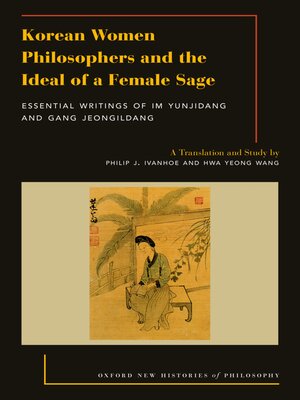Korean Women Philosophers and the Ideal of a Female Sage
ebook ∣ Essential Writings of Im Yungjidang and Gang Jeongildang · Oxford New Histories of Philosophy
By Philip J. Ivanhoe

Sign up to save your library
With an OverDrive account, you can save your favorite libraries for at-a-glance information about availability. Find out more about OverDrive accounts.
Find this title in Libby, the library reading app by OverDrive.



Search for a digital library with this title
Title found at these libraries:
| Loading... |
Korean Women Philosophers and the Ideal of a Female Sage introduces the lives and ideas of two female Korean Confucian philosophers from the late Joseon Dynasty (18th-19th century), Im Yunjidang (1721-1793) and Gang Jeongildang (1772-1832), examining how their writings contribute to contemporary philosophical inquiry. Both philosophers are known for arguing that women are as capable as men of attaining the highest forms of intellectual and moral achievement and thereby can become female sages (yeoseong), with their reasoning building on distinctively Confucian philosophical claims about the original, pure moral nature shared by all human beings. Hwa Yeong Wang and Philip J. Ivanhoe provide an analysis of the social, political, and historical factors that surrounded these women and informed their writing. This volume explores how these female philosophers navigated the challenges presented by the extensively patriarchal culture in which they lived. Im Yunjidang and Gang Jeongildang's resistance and response to the patriarchal context of late Joseon society informs the content and style of their writing, producing original philosophical ideas that remain of great value to the field today. By providing elegant English translations, thorough annotations, and analysis of the cultural and historical context of these writings, Wang and Ivanhoe provide a nuanced, informative, and invaluable look at the work of these two notable Korean female philosophers. This volume is certain to appeal to readers across the areas of Women's Studies, Philosophy, East Asian Studies, Literature, and more, diversifying the current canon and providing perspectives on philosophy that have for far too long been overlooked.






